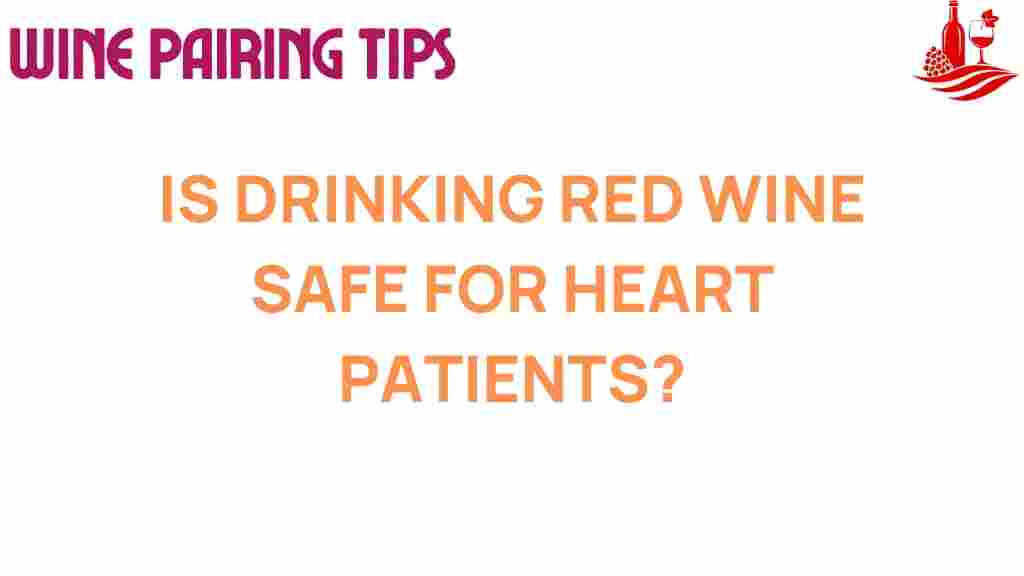Can Heart Patients Safely Enjoy Red Wine?
For many, the idea of enjoying a glass of red wine is synonymous with relaxation and social gatherings. However, for heart patients, the question of whether they can safely indulge in red wine is a complex one. In this article, we will uncover the truth about red wine, its potential health benefits, and the implications of alcohol consumption for cardiovascular health. By exploring the relationship between red wine and heart health, we will help you make informed lifestyle choices.
The Connection Between Red Wine and Heart Health
Red wine is often touted for its heart health benefits, primarily due to the presence of antioxidants like resveratrol and flavonoids. These compounds are believed to contribute to cardiovascular health by:
- Reducing inflammation
- Improving cholesterol levels
- Enhancing blood vessel function
- Preventing blood clots
Some studies suggest that moderate consumption of red wine may be associated with a lower risk of heart disease. However, it is essential to consider the quantity and frequency of consumption, especially for heart patients.
Understanding the Role of Antioxidants
Antioxidants are substances that help neutralize free radicals in the body, which can contribute to various health issues, including cardiovascular diseases. Red wine is rich in antioxidants, particularly:
- Resveratrol: Found in the skin of grapes, resveratrol has been linked to improved heart health.
- Flavonoids: These compounds help improve blood circulation and reduce blood pressure.
While these antioxidants are beneficial, the key is moderation. Heart patients must be cautious about their alcohol consumption to avoid potential risks.
What Does “Moderation” Mean?
Moderation in alcohol consumption is generally defined as:
- Up to one drink per day for women
- Up to two drinks per day for men
For red wine, one drink is typically considered to be about 5 ounces (approximately 150 ml). This guideline is crucial for heart patients, as excessive alcohol can lead to adverse effects on heart health.
Wine Studies and Heart Patients
Numerous wine studies have explored the relationship between red wine and heart health. For instance, some research suggests that moderate red wine consumption may:
- Lower LDL (bad) cholesterol levels
- Increase HDL (good) cholesterol levels
- Reduce the risk of developing blood clots
However, it is essential to note that these benefits are primarily seen in those who consume alcohol in moderation. For heart patients, consulting with a healthcare professional is vital before introducing red wine into their diet.
Potential Risks for Heart Patients
While red wine may offer some health benefits, it is not without risks, especially for heart patients. Some of the potential risks include:
- Increased Blood Pressure: Excessive alcohol consumption can lead to hypertension.
- Weight Gain: Alcohol contains calories, which can lead to weight gain if not accounted for in the diet.
- Interactions with Medications: Alcohol can interact negatively with certain heart medications.
Heart patients should carefully weigh these risks against the potential benefits of moderate red wine consumption.
Making Informed Lifestyle Choices
For heart patients considering red wine, making informed lifestyle choices is essential. Here are some tips:
- Consult with Your Doctor: Always discuss alcohol consumption with your healthcare provider, especially if you have existing heart conditions.
- Choose Quality Over Quantity: Opt for high-quality red wines that are rich in antioxidants.
- Balance with a Healthy Diet: Incorporate a balanced diet rich in fruits, vegetables, whole grains, and lean proteins.
- Stay Active: Regular exercise can help improve cardiovascular health.
By making these lifestyle choices, heart patients can enjoy the potential benefits of red wine while minimizing risks.
Step-by-Step Process to Safely Enjoy Red Wine
If you are a heart patient considering enjoying red wine, follow these steps:
- Consult Your Healthcare Provider: Discuss your current health status and any medications you are taking.
- Determine Safe Consumption Levels: Understand what constitutes moderate drinking for you.
- Choose the Right Wine: Look for wines with higher antioxidant content, such as Pinot Noir or Cabernet Sauvignon.
- Monitor Your Reactions: Pay attention to how your body responds to red wine and adjust accordingly.
- Pair with Food: Enjoy red wine with a meal to help mitigate its effects on blood sugar and overall health.
Troubleshooting Tips for Heart Patients
If you experience any negative effects after consuming red wine, consider these troubleshooting tips:
- Reduce Intake: If you notice adverse reactions, consider reducing the amount of wine you consume.
- Switch Varieties: Try different types of red wine to see if one suits your body better than others.
- Stay Hydrated: Drink water alongside wine to help your body process alcohol more effectively.
- Keep a Journal: Track your wine consumption and any effects you notice to discuss with your doctor.
Conclusion
In conclusion, heart patients can potentially enjoy red wine, but it is crucial to do so in moderation and after consulting with a healthcare provider. The antioxidants found in red wine may offer some heart health benefits, but the risks associated with alcohol consumption cannot be overlooked. By making informed lifestyle choices and being aware of personal limits, heart patients can make the most of their health journey while enjoying the occasional glass of red wine.
For more information on heart health and lifestyle choices, check out this resource.
If you’re interested in exploring more about the health benefits of wine, consider visiting Wine Studies.
This article is in the category Tips and created by Wine Pairing Tips Team
